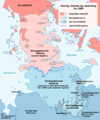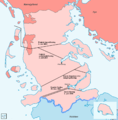Denmark–Germany border
This article needs additional citations for verification. (October 2014) |
| Denmark–Germany border | |
|---|---|
 Border marking stone | |
| Characteristics | |
| Entities | |
| Length | 68 km (42 mi) |
| History | |
| Established | 1920 |

The Denmark–Germany border (Danish: Grænsen mellem Danmark og Tyskland; German: Grenze zwischen Dänemark und Deutschland) is a land and maritime border between the modern countries of Denmark and Germany. It includes Denmark's only land border, which is 68 kilometres (42 mi) long.
History
[edit]In the treaty of Heiligen in 811, the Eider river was recognized as a border between Denmark and the Frankish Empire.[1] As a swampy river, it formed a natural border. In the highest area near the watershed, it was drier. The ancient travel route of Hærvejen went there, and a defense wall, Danevirke, was built there. Later the duchies of Schleswig and Holstein arose. Before 1864 Schleswig was a fiefdom of Denmark, while Holstein was a fief of the Holy Roman Empire (until 1806) and a member of the German Confederation (after 1815). Both territories were ruled by the Danish king in his additional role as Duke of Schleswig and Duke of Holstein (occasionally together with other Dukes, like the Gottorp Dukes). The border between the Danish fief of Schleswig and the German fief of Holstein still ran along the Eider river, the boundary between the duchies and the Kingdom of Denmark ran along the Kongeå watercourse, and the southern boundary of the Danish monarchy (≈Helstaten) ran along the Elbe.
In 1864, Schleswig-Holstein was conquered by Prussia, and so an international border was created between Denmark and Germany/Schleswig-Holstein. It went from a place at the coast 5 kilometres (3 mi) south of Ribe, rounded Ribe on 5 kilometres (3 mi) distance, then went eastbound just south of Vamdrup, and just north of Christiansfeld to the Baltic Sea.
In 1920, the border was moved about 50 kilometres (31 mi) southward to the present position, as determined by the Schleswig referendum in 1920. This approximately followed the not clearly defined language border.
-
The duchies Schleswig, Holstein and Lauenburg before 1864
-
Border proposals in 1864
-
Results of the vote in 1920
-
Schleswig/Slesvig with former and present-day administrative borders
Border controls
[edit]In 2001, all border controls were removed based on the Schengen Agreement.
In response to the Swedish border control due to the European migrant crisis, border checks were temporarily introduced starting January 4, 2016. Prime minister Lars Løkke Rasmussen cited fear of accumulation of illegal migrants in Copenhagen as one of the reasons for this decision.[2] It was reported that the border controls at the German border cost the Danish tax payers 1.25 billion DKK (€167 million) from 2016 until mid-2019.[3] They were never fully ended before the COVID-19 pandemic in early 2020,[4] which caused renewed border closures throughout Europe.
To pass the border, an approved travel document is needed. This is mainly a passport. But also a national identity card from the European Economic Area is acceptable, although Denmark does not issue such cards, so a passport is needed for Danes for crossing back into Denmark.[5]
Wild boar fence
[edit]In January 2019, the Danish government began constructing a fence along the border to keep wild boar, which can carry African swine fever virus, from crossing into Denmark. The 1.5 metres (4.9 ft) high, nearly 70 kilometres (43 mi) long fence—spanning the entire land border—was completed in December 2019 at an estimated cost of 30.4 million Danish kroner.[6][7][8] The fence has created some protests. In May 2019 a volleyball tournament was held over the fence as a publicity event which was given some media attention.[9] After completion there was a decision to raise it by adding wires over it, because animals like deer have been killed after being injured because of jumping over the fence.[10]
-
Western end of the fence at the Wadden Sea
-
Eastern end of the fence in the Flensburg Firth
-
Gendarmstien passing through the fence at Padborg
Border crossings
[edit]Road
[edit]| Image | Danish Road/Track Name[11] | German Road/Track Name [11] | Type of crossing [11] |
Border indicated by[12] | Border checkpoint?[12] |
Coordinates [11] |
|---|---|---|---|---|---|---|
| Slusevej | - | Road | - | - | 54°54′40″N 8°38′19″E / 54.91115°N 8.63868°E | |
| Siltoftvej | - | Road | Old border checkpoint building | - | 54°54′41″N 8°40′11″E / 54.91131°N 8.6696°E | |
| Rudbølvej | Rosenkranzer-Straße | Road | National speed limits sign | Yes | 54°53′48″N 8°45′01″E / 54.89669°N 8.75033°E | |
| Møllehusvej | (L6) Landesstraße 6 | Road | National speed limits sign | - | 54°54′22″N 8°49′56″E / 54.90608°N 8.83231°E | |
| - | Marschbahn | Track | - | - | 54°53′58″N 8°52′22″E / 54.89938°N 8.87289°E | |
| Road | National speed limits sign | Yes | 54°54′14″N 8°54′37″E / 54.90385°N 8.91034°E | |||
| Vindtvedvej | - | Road | Small sign showing municipality | - | 54°54′00″N 8°57′46″E / 54.89996°N 8.96273°E | |
| Beierskrovej | Beyersweg | Road | Small sign showing municipality | - | 54°53′23″N 8°59′49″E / 54.88975°N 8.99681°E | |
| Pebersmarkvej | (L313) Pepersmarker Weg | Road | National speed limits sign | Yes | 54°52′18″N 9°04′44″E / 54.87165°N 9.07882°E | |
| Grænsevejen | Bögelhuus | Road | National speed limits sign | - | 54°52′23″N 9°08′31″E / 54.87303°N 9.14207°E | |
| Sofiedalvej | Zur Fehle | Road | National speed limits sign | - | 54°50′59″N 9°14′25″E / 54.84984°N 9.24032°E | |
| Kristiansmindevej | Wilmkjerweg | Road | Small sign showing municipality | - | 54°48′11″N 9°17′25″E / 54.80309°N 9.29032°E | |
| Road | National speed limits sign | Yes | 54°48′21″N 9°19′41″E / 54.80574°N 9.32817°E | |||
| Industrivej (Padborg) | (L17) Landesstraße 17 | Road | National speed limits sign | Yes | 54°48′58″N 9°21′40″E / 54.81615°N 9.36112°E | |
| Fredericia–Flensborg-banen | Bahnstrecke Fredericia–Flensburg | Track | - | - | 54°48′55″N 9°21′47″E / 54.81525°N 9.36301°E | |
| Haraldsvej | - | Walking path | - | - | 54°49′02″N 9°21′49″E / 54.8172°N 9.36373°E | |
| Rønsdamvej | - | Walking path | Red-white boom barrier | - | 54°50′02″N 9°22′33″E / 54.8338°N 9.37583°E | |
| - | - | Walking path | - | - | 54°50′20″N 9°23′07″E / 54.83876°N 9.38521°E | |

|
Road | National speed limits sign | Yes | 54°50′22″N 9°24′16″E / 54.83956°N 9.40443°E | ||
| Madeskovvej | Teichweg | Walking path | - | - | 54°50′32″N 9°24′26″E / 54.8422°N 9.40712°E | |
| Skomagerhusvej | Dammweg | Walking path | - | - | 54°49′55″N 9°25′13″E / 54.83198°N 9.42032°E |
Rail
[edit]There are two railway lines across the land border:
- The main route is via the Fredericia–Padborg/Flensburg–Padborg lines, which cross the eastern part of the land border between Padborg and Flensburg. This route, which is electrified, is operated by EuroCity (EC), EuroNight (EN) and regional trains of DSB. The line also used to carry CityNightLine trains.[13][14]
- The western part of the land border is crossed by the Marsh Railway line between Tønder and Süderlügum.[15] This line is not electrified, and is therefore operated by DMUs and diesel locomotive hauled trains.
A third route, the Vogelfluglinie (lit. 'bird flight line' in German), which included a train ferry over the countries' maritime border (between Rødby and Puttgarden), closed in December 2019. Until then, this route carried EuroCity and ICE services.
The Fehmarn Belt Fixed Link is a planned rail and road tunnel across the Fehmarnbelt.
See also
[edit]References
[edit]- ^ Thursten, Tina L. (2001). Landscapes of Power, Landscapes of Conflict: State Formation in the South Scandinavian Iron Age. New York: Kluwer Academic. p. 340. ISBN 0-306-44979-X.
- ^ "Berlingske | Læs nyheder på berlingske.dk".
- ^ Grænsekontrollen har nu kostet mindst 1,25 milliarder kroner
- ^ Nielsen, Nikolaj (2019-12-09). "Revealed: little evidence to justify internal border checks". EUobserver. Archived from the original on 2019-12-12. Retrieved 2021-07-21.
- ^ Rejselegitimation
- ^ "Construction begins on wild boar fence" (Press release). Copenhagen: Ministry of Environment and Food of Denmark. 28 January 2019. Archived from the original on 19 December 2020. Retrieved 29 January 2019.
- ^ Topp, Anders (28 January 2019). "Danmark begynder at bygge hegn mod vildsvin". dr.dk. Danmarks Radio. Retrieved 29 January 2019. (In Danish)
- ^ Walsh, Alistair (28 January 2019). "Denmark starts building anti-swine border fence". dw.com. Deutsche Welle. Retrieved 29 January 2019.
- ^ "Unge spillede volleyball hen over vildsvinehegn". Danmarks Radio (in Danish). 19 May 2019. Retrieved 19 May 2019.
- ^ "Vildsvinehegn bliver ændret for at undgå at skade råvildt" (in Danish). 11 December 2019.
- ^ a b c d See Google Maps for coordinates.
- ^ a b See Google Street View for respectively coordinate.
- ^ Køreplan Timetable/ International Køreplan 20.06.2010-11.12.2010 (archived) originally at dsb.dk, accessed 5 January 2019
- ^ Køreplan Timetable/ International Køreplan 09.12.2012-14.12.2013 (archived) originally at dsb.dk, accessed 5 January 2019
- ^ Wir verbinden! Festland mit Inselnfähren! Deutschland mit Dänemark! (We connect! Ferries between the mainland and islands! Germany with Denmark!) neg-niebuell.de, accessed 5 January 2019








